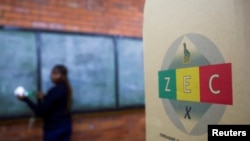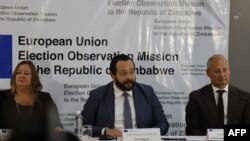Zimbabweans went to the polls on Wednesday — and subsequently Thursday —in polling marred by delays.
While addressing media Friday, international observers listed several issues with Zimbabwe's elections, among them canning of opposition rallies, denial of accreditation to several foreign media, missing voters names from the roll at their polling station, biased state media and voter intimidation.
The head of the European Union observer mission, Fabio Massimo Castaldo, said the election "fell short of many regional and international standards."
"Violence and intimidation resulted ultimately in a climate of fear," he said.
Amina Mohamed, the chair of the Commonwealth observer mission, said the voting process in Zimbabwe was “well conducted and peace” but added that there were a “number of significant issues” that impacted the election’s “credibility” and “transparency.”
Mohamed’s sentiments were echoed by Nevers Mumba, Zambia’s former vice president and the head of the Southern African Development Community's mission.
"Some aspects of the ... election fell short of the requirements of the constitution of Zimbabwe, the electoral act and the SADC principals and guidelines governing democratic elections," said Mumba.
It was rare rebuke from the 16-nation SADC body, whose observers usually endorse polls in the member countries.
The election is being watched across southern Africa as a test of support for 80-year-old President Emmerson Mnangagwa's ZANU-PF party, whose 43-year rule has been battered by a moribund economy and charges of authoritarianism.
The largest opposition, Citizens Coalition for Change, which poses the biggest challenge to Mnangagwa and had more than 100 of its campaign meetings banned, lashed the electoral process as "fundamentally flawed."
Voting was forced to stretch into an unprecedented second day over delays in printing of ballot papers in some key districts including in the opposition stronghold Harare.
Less than a quarter of polling stations in Harare opened on time on Wednesday, the first day of voting.
The problems forced Mnangagwa, who is seeking a second term, to issue a late-night directive extending the vote by another day.
David Carroll, director of the Carter Center's Democracy Project, who is in Harare monitoring the election process, told VOA "Although election day in Zimbabwe went smoothly in most places," the delays in other provinces such as Bulawayo and Manicaland posed challenges.
Carroll said it was unfortunate the offices of citizen domestic observer groups, the Zimbabwe Elections Support Network and the Election Resource Center, who are "highly respected," were raided by police.
Police on Thursday accused the two accredited poll monitoring groups of "subversive and criminal activities as part of an opposition plan to fabricate the results.
Forty-one workers were arrested and remain detained. The Zimbabwe Lawyers for Human Rights said the workers were carrying out their mandate as election observers.
Carroll said, however, compared to previous election cycles "it's been relatively peaceful so far and we're hopeful it will remain to be in the days ahead."
Despite voting delays on some parts of Zimbabwe, Rodney Kiwa, the deputy chairman of Zimbabwe’s Electoral Commission, ZEC, Thursday said authorities are confidence that results will be announced before the Tuesday deadline.
Information for this report came from AFP. VOA's Carol Van Dam contributed.


Forum